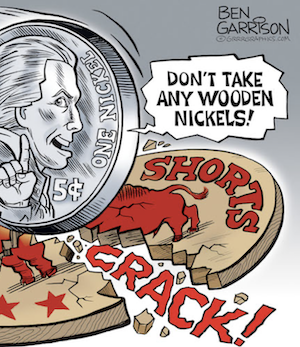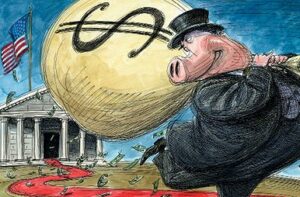
But the Fiat has collapsed anyway…
The year was 1901, and it was pretty much a who’s who of American business and finance at the time. Andrew Carnegie. JP Morgan. Charles M. Schwab. Elbert Gary (namesake of the city Gary, Indiana).
It would be as if Elon Musk, Billy Gates, and Carl Icahn all got together on a new venture. It would be pretty much guaranteed to be a big deal.
Those early 20th century titans formed what would become the world’s largest and most important company in that era – US Steel.
This was a period of history in which the United States was growing by leaps and bounds. Entire cities were built from nothing. Rail was being feverishly laid across the country. New buildings and skyscrapers were going up in major cities.
And steel made it all possible. In 1901 it was the most vital commodity in the world, far more important than oil. And US Steel dominated the market; they had— by far— the best quality, the most efficient production, the most reliable distribution.
But that was more than a century ago.
Today US Steel is barely alive. It loses more than a billion dollars each year in negative Free Cash Flow, and it has only managed to survive by issuing a mountain of debt.
Now, it would be easy to blame US Steel’s problems on competition with rising, low-cost manufacturing superpowers like China and India (whose nations boast the world’s #1 and #2 steel producers respectively).
But that’s a far too simplified (and frankly incorrect) explanation. The US economy – including the steel manufacturing industry – is far more productive than India or China. Way more.
China’s Baowu Steel Group is the world’s largest steel company by production volume, with an annual output of more than 130 million metric tons. But with nearly 400,000 employees, the Chinese firm’s steel production per employee is less than HALF of what a US Steel worker can produce.
So, US Steel is still able to out-produce its Chinese competitors.
Cost is obviously a factor; US workers are clearly more expensive. But a far greater issue is all the wasteful political bureaucracy. The unions. The endless regulations and permitting. The parade of government inspectors. And most of all, politicians who deliberately hurt the company for political points.
The latter failure now belongs squarely to Joe Biden, who recently went out of his way to destroy any hope of US Steel resurrecting its former greatness.
It started in late 2023, when Japan’s largest producer, Nippon Steel, made an offer to buy US Steel. Nippon made a pretty sweet offer – $55 per share, a premium of almost 60% above US Steel’s stock price at the time.
On top of that, Nippon pledged to invest billions of dollars into US Steel to revitalize its factories and upgrade production capacity. They promised to honor all union contracts. They committed to support any national security related export controls.
This is what you call a win/win deal. US Steel wins. Nippon Steel wins. America wins. Japan (one of America’s closest allies) wins. Win/win. That’s what capitalism is all about.
Sadly, this is rapidly becoming a lost concept in the Land of the Free… because Joe Biden, the hilariously self-proclaimed capitalist, shat all over the deal pretty much from day 1.
It was ridiculous to start with why the President of the United States felt it necessary to opine on a commercial transaction between two private companies. The decision to sell/not sell should have been up to the shareholders of US Steel.
 But Joe Biden thinks he knows better than the millions of US Steel stockholders who stood to gain a nearly 60% profit from the sale.
But Joe Biden thinks he knows better than the millions of US Steel stockholders who stood to gain a nearly 60% profit from the sale.
The Biden administration then proceeded to dump all over Nippon Steel, claiming (without evidence) that it would harm unions. So, Nippon Steel offered up $5,000 retention bonuses for workers and made firm job guarantees.
Then Joe Biden’s Committee for Foreign Investment in the US (Cfius) claimed (also without evidence) that it would harm national security – with the dubious argument that Nippon Steel would reduce factory output in the US.
So, Nippon Steel offered to let Cfius essentially dictate production capacity… plus a number of other political supplicants.
But in the end, nothing that Nippon Steel said or did amounted to any good. The guy who shakes hands with thin air issued a final order last Friday formally killing the takeover, i.e. a deal that had serious potential to rescue US Steel and save tens of thousands of jobs.
One of the self-serving accomplices whose fingerprints are all over this is Lourenco Goncalves, a Joe Biden loyalist and the CEO of rival American steelmaker Cleveland-Cliffs.
Goncalves has lofty ambitions of controlling the entire steel industry in the United States… so he lobbied the Biden administration to block the Nippon deal. Unsurprisingly, US Steel’s stock price plummeted, opening an opportunity for Cleveland-Cliffs to scoop it up on the cheap.
Maybe Goncalves succeeds. But his own company is also struggling – negative free cash flow and a mountain of debt. So, it’s questionable whether banks and investors will stump up the cash for the merger of two declining businesses.
If he doesn’t succeed in buying US Steel, it’s entirely possible that the company could fail. Tens of thousands of workers will be out of a job, and entire towns whose economies revolve around the local steel plant will go into a nosedive.
Either way, Goncalves wins because his company will end up with a de-facto monopoly over steel production in the United States.
All of the electrification that Joe Biden has mandated (like EV charging stations), plus even basic infrastructure and construction, will go through Goncalves and Cleveland-Cliffs. And it’s pretty obvious that a leftist monopoly over American steel production will be yet another inflationary force pushing prices higher.
So, this is a win/win for Joe Biden’s buddy…
…but a giant lose/lose for America!
To your freedom,
James Hickman
January 7, 2025








